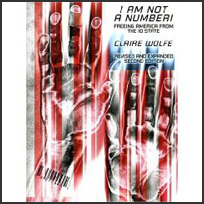
It’s so easy, and so much fun, to write about things you don’t like: to sling insults, sneer, be snide, and all those other sn and sl words. People who like to do this have even ruined the perfectly good word “criticism” which used to mean a sober consideration of an artist’s work, but has been corrupted into a totally negative connotation. Criticism doesn’t only mean slamming. But the other kind of criticism is hard work: it’s so much more of a challenge to articulate why someone’s work moves you, and do it without sounding hokey.
Still, I like nothing better than turning people on to the writers I get excited about. One of them is Claire Wolfe, who describes herself as “a born arty type and a made outlaw.” My kind of woman! I place her right up there on the highest tier of my pantheon, with the other avatars of the most healthy and creative human possibilities. The ones who are going in a direction that could take us all to a much better place, and I don’t mean heaven, I mean a world that works for everyone.
She has a book out now, the revised and expanded second edition of her recognized libertarian classic, I Am Not a Number! Freeing America from the ID State. She’s written a bunch of other books, too. In fact that’s the first question a person asks after reading one of them: “Is there more?” You find yourself wanting to take a couple of weeks off from work to check out the rest.
One of my favorite Wolfe quotes:”There is no lower life form than the agent provocateur.” I think I’ve met one. Speaking on the CSU campus about the absurdity of certain laws, I was startled when a wild-eyed fellow jumped from his seat and commenced to rant about armed struggle.
A sage once said, “If we keep on the way we’re going, we’re going to wind up where we’re headed.” So this is a book to get now, because when we do wind up where we’re headed, a book like this is only one of the things we won’t be able to get.
For science fiction fans, one of the perennially fascinating themes is the telepathic society. If everyone knew everything about everyone else, what kind of world would that look like? Maybe all those knowledge bytes would simply cancel each other out, and become the practical equivalent of nobody knowing anything about anybody. It’s an interesting concept to explore – but that’s what speculative fiction is for.
Unfortunately, what we increasingly have here in the real world is something else again, and this grows more grimly apparent every day: an unequal distribution of information. There are a lot of them out there, data specialists working toward evil ends, who know every little nit-picky thing about us, but we don’t know jack about them. This is very bad. And Claire Wolfe if full of ideas about how to curb this ominous trend, as well as the lowdown on why it is so very bad, in case the full ominousness hasn’t struck us yet. The examples are encroaching so fast that even vigilant watchers like herself have a hard time keeping with them.
In the great tradition of Harriet Tubman, who led slaves out of bondage via the underground railroad, Claire Wolfe provides clear directions back to America. The America some of us love and miss. An America where, to give just one little example, paying for something with legal tender didn’t used to be seen as suspicious behavior.
It’s about “how to retain ownership of our lives.”
Wolfe reminds us that the recipe for freedom is a willingness to take risks, combined with a re-evaluation of priorities, followed by making the appropriate changes in lifestyle. (As another sage expressed it, you can do anything you want as long as you’re willing to pay the price. A lot of times you don’t end up having to pay the price – but you have to be willing.)
She discusses the extremes: primitive living at a level so far below the radar that the authorities don’t bother with you – which can be a life of deprivation and loneliness – or sophisticated hiding – which can be ditto. How to escape? Shooting the bastards is not a real good idea, since all it tends to do is make the next crop of bastards even nastier.
Millions of Americans, Wolfe feels, “have now reached their line in the sand” and are ready to stop being sheeple. The preferred method is to “creatively disregard” the rulers – emotionally, mentally, philosophically and if necessary even physically. Leave the government even if you can’t leave the country. Many methods of non-cooperation are suggested here, along with advice about how to handle such things as financial and medical affairs. For someone who hasn’t heard about, for instance, the Free State Project, this could be a major life-changer.
The slogan of the cyberpunk crowd was, “Information wants to be free.” These days, it’s much more useful to remember this – “Information want to help us be free.” The opportunities for further self-enlightenment in Wolfe’s generous “Freedom Resources” section prove it.
(Originally published March 16, 2003)